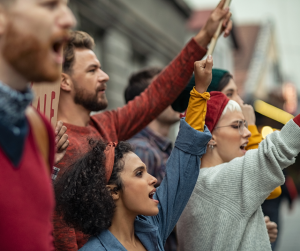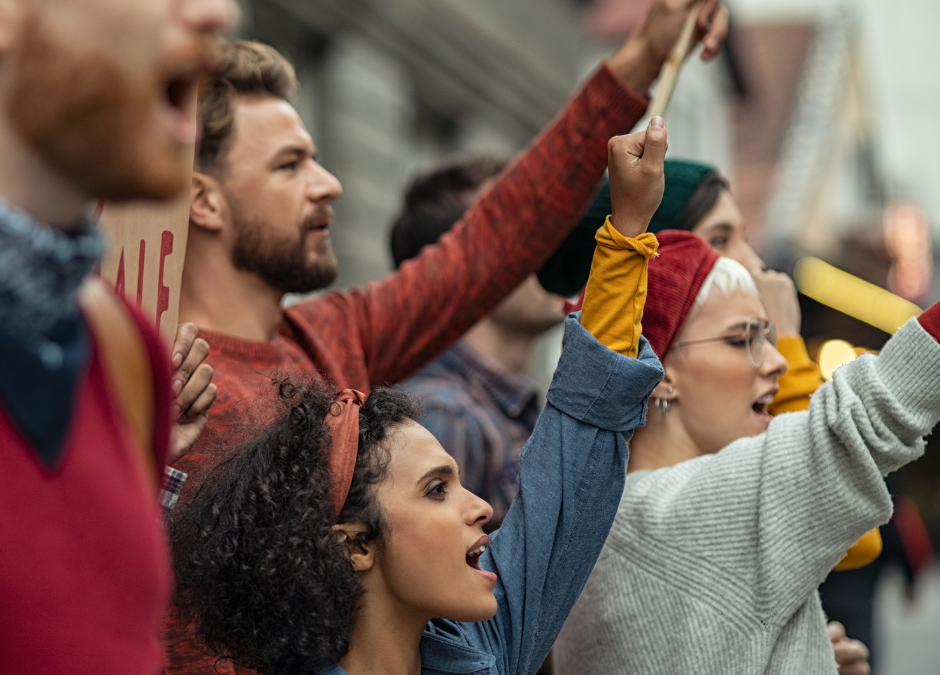There has been a recent image circulating on social media with the text:
“But what can I do? I’m just one person!” Said 7 billion people.
According to the recent national census, there are 343,311 Christians in Leeds with over 140 distinct congregations throughout the different communities in the city. While we may often feel small, isolated and powerless to bring about change, when we join with others and take a lead in calling for justice then we will have a huge impact on the city of Leeds as we live out the Gospel message.
 For me, the work of Leeds Citizens and the methodology of community organising offers one way that we as Christians in Leeds can work to bring about those small changes for justice in our society. By campaigning and holding people in positions of power to account, we can try to make sure that rules and traditions are not interpreted to give one person or group an unfair advantage over others. With Leeds Citizens we can work to create a world in which, like Jesus, we privilege those on the margins of society.
For me, the work of Leeds Citizens and the methodology of community organising offers one way that we as Christians in Leeds can work to bring about those small changes for justice in our society. By campaigning and holding people in positions of power to account, we can try to make sure that rules and traditions are not interpreted to give one person or group an unfair advantage over others. With Leeds Citizens we can work to create a world in which, like Jesus, we privilege those on the margins of society.
I recently attended a service led by Mary Patchett, a local preacher in the Leeds North and East Methodist Circuit. From the beginning of the service I was immediately struck by the connections with the work of LCI and Leeds Citizens. Mary spoke on Matthew 15:10-28. Mary drew strong connections to the need to be open to change, and to challenge tradition in order to be part of God’s work to bring justice to our communities today.
Mary began by introducing us to the first nine verses of Matthew 15, where some Pharisees challenged Jesus, questioning why he allows his disciples to break the law by eating without first washing their hands. In reply, Jesus challenged them and quoted from Isaiah, to say that they valued human laws and traditions over following God.
We were invited to reflect on how and why things have changed within our own lifetimes. The responses varied, with some talking about financial pressure or peer pressure, others mentioned education, and greater awareness through the news and social media. Several people talked about the increasing pace of change. People particularly focused on change being imposed by an outside source, with several people talking about the global changes caused by the invasion of Ukraine. I reflected that during my lifetime it has become more acceptable for us to challenge laws and traditions in a way that my parents and grandparents were not encouraged to do. This can be a very uncomfortable process for those challenging tradition as well as those who are being challenged. It can often seem easier to maintain the status quo and simply stick to tradition.
Mary drew our conversations together and summarised by pointing out that while we may not always agree with every change that has taken place within our own lifetimes, change is an inevitable part of life and in the end, nothing stays the same. Change is brought about in a variety of ways depending on the cultural and political context. In much of western society it is through pressure put on governments by groups and individuals discussing the injustice of a system. In the reading, Jesus criticised the Pharisees because of their insistence on strict adherence to tradition and obeying the letter of the law over following the intention of the law and caring for those in need.
Change happens when some aspect of society is seen to be unjust. Pressure for change is brought about through individuals standing up and being counted for justice for others; in serving others. Throughout history there are examples of people standing up to call for an end to slavery or for equal rights for women and other groups. They do not all belong to the history books; there are plenty of examples today on a local, national and even international scale. In Leeds this has been demonstrated in the work of Leeds Citizens, for example in Beeston where the local Citizens group have recently won improvements to local footpaths for better accessibility. When we challenge injustice in our local or national contexts we may not succeed in bringing about change on a large scale, but we can contribute. If no one does anything, then absolutely nothing will change!!
If you would like to find out more about the relationship between community organising, social justice and the Gospel, then join us at Roscoe Methodist Church on the 12th of September, as we explore the practice and theology of community organising. Alternatively feel free to get in touch for a one to one conversation with Paul Coleman, our Faith at the Margins Lead on [email protected]

